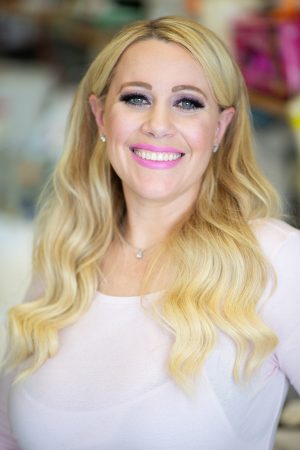
July 23, 2024
LA JOLLA—Salk Professor Janelle Ayres has been selected as a 2024 Howard Hughes Medical Institute (HHMI) Investigator. The HHMI Investigators program awards established scientists with approximately $9 million in funding over seven years to pursue boundary-breaking research in their field. The honor recognizes her influential work in immunology and microbiology and its applications to the global crisis of antibiotic resistance.
Ayres is among 26 other 2024 selectees, who will join more than 250 standing Investigators—including Salk Professors Joanne Chory (1997), Joseph Ecker (2011), and Kay Tye (2021).

“Janelle’s research on microbial pathogenesis has greatly enhanced our understanding of host-microbe interactions,” says Salk President Gerald Joyce. “Receiving this support from HHMI is a wonderful recognition of her achievements thus far and her potential for continued excellence in the years ahead.”
Ayres is head of the Molecular and Systems Physiology Laboratory, a member of both the Gene Expression Laboratory and the NOMIS Center for Immunobiology and Microbial Pathogenesis, and holder of the Salk Institute Legacy Chair.
Ayres’ discovery of the “Cooperative Defense System” has radically shifted scientists’ perspectives on health and disease. Rather than thinking of health as simply the absence of disease, Ayres describes health as an active biological process requiring unique endurance and resilience mechanisms—altogether dubbed the Cooperative Defense System.
A major principle of this work is the revelation that a person or “host” infected with a pathogen does not need to kill the pathogen to survive. Rather, they can avoid disease by learning to adapt and cooperate with the pathogen.
Ayres’ findings have sweeping therapeutic applications. In 2023, Ayres applied these principles to a study of diarrheal infections, as well as the process of cachexia (losing fat and muscle stores during disease). Her research on diarrheal infections revealed a new potential vaccine strategy for diarrheal diseases and other infections, while her research on cachexia revealed that muscle loss surprisingly contributes to the management of disease.
The clinical implications of Ayres’ work will fuel her future research as an HHMI Investigator. Her new experiments will dig deeper into the factors that make the difference between an infected individual who remains healthy, and one that becomes sick and dies. As these differences and their mechanisms become clearer, she will be able to reveal new strategies to treat infections that can address the global crisis of antibiotic resistance, better ensure patient survival when infected, and better prepare us for the next pandemic when it happens.
To maximize the impact of this work, Ayres can now lean on her HHMI community of trusted colleagues for additional scientific support and outreach.
Ayres’ other recent achievements include a $1 million grant from the W. M. Keck Foundation, the NIH Director’s Pioneer Award in 2018, and induction into the American Academy of Microbiology’s Fellowship Class of 2024. She was the 2018 recipient of the Blavatnik National Award for Young Scientists for Life Sciences, one of the world’s largest unrestricted prizes for early career scientists.
About the Howard Hughes Medical Institute:
The Howard Hughes Medical Institute (HHMI) advances the discovery and sharing of scientific knowledge to benefit us all. Founded in 1953, HHMI is a biomedical research organization and philanthropy with a vibrant community of researchers, educators, students, and professionals. Together, we’re unlocking the fundamentals of biology and building an open, inclusive future for science.
About the Salk Institute for Biological Studies:
Unlocking the secrets of life itself is the driving force behind the Salk Institute. Our team of world-class, award-winning scientists pushes the boundaries of knowledge in areas such as neuroscience, cancer research, aging, immunobiology, plant biology, computational biology, and more. Founded by Jonas Salk, developer of the first safe and effective polio vaccine, the Institute is an independent, nonprofit research organization and architectural landmark: small by choice, intimate by nature, and fearless in the face of any challenge. Learn more at www.salk.edu.
Office of Communications
Tel: (858) 453-4100
press@salk.edu